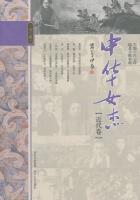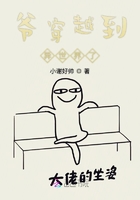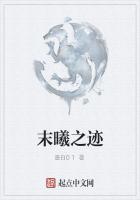One day I felt that I must leave this country of many mountains, great rocks, and storms。 I said to Penelope:
“I feel I can no longer look at all this misery。 I have a longing to sit in a mosque with one quiet lamp—I long for the feeling of Persian carpets beneath my feet。I am tired of these roads。Will you come with me on a little flight to Constantinople?”
Penelope was delighted。 We changed our tunics for quiet dresses and took the boat for Constantinople。During the day I remained in my cabin on deck, and at night, when the other passengers were asleep, I slipped a scarf over my head and stepped out of my door into the moonlit night。Leaning over the side of the ship, also moon?gazing, was a figure dressed entirely in white, even to white kid gloves—the figure of a young man, holding in his hand a little black book, from which he appeared from time to time to read, then murmur what seemed to be an invocation。His face, white and drawn, was lit by two magnificent dark eyes, and crowned by jet black hair。
On my approach the stranger spoke to me。
“I dare to address you,”he said,“because I have a sorrow as great as your own, and I am returning to Constantinople to comfort my mother, who is in great afiction。 A month ago she had the news of the tragic suicide of my eldestbrother, and, barely two weeks later, followed another tragedy—the suicide of my second brother。I am the only one remaining to her。But how can I be of any consolation to her?I who am myself in so desperate a mood that I feel the happiest thing would be to follow my brothers。”
We talked together and he told me he was an actor, and the little book in his hand was a copy of Hamlet, which part he was then studying。
We met again upon the deck the next evening, and like two unhappy ghosts, each immersed in his own thoughts yet each finding some comfort in the presence of the other, we remained there till the dawn。
When we reached Constantinople, he was met and embraced by a tall, handsome woman in deepest mourning。
Penelope and I descended at the Péra Palace Hotel and spent the first two days of our visit wandering about Constantinople, chiefy in the old town among the narrow streets。On the third day I had an unexpected visitor。It was the mother of my sorrowful friend of the boat, the woman who had met him。She came to me in the greatest anguish。She showed me the pictures of her two beautiful sons whom she had lost and said,“They are gone, I cannot bring them back, but I have come to beg you to help me save the last—Raoul。I feel he is following his brothers。”
“What can I do,”I said,“and in what way is he in danger?”
“He has left the city and is at the little village of San Stefano, quite alone in a villa, and from his desperate expres?sion as he left I can only fear the worst。 You made such a deep impression on him that I think you might make him see the wickedness of his action, make him pity his mother and return to life。”
“But what is the reason of his desperation?”I asked。
“I do not know, any more than I know the reason for the suicide of his brothers。 Beautiful, young, fortunate, why did they only seek death?”
Very much touched by the mother's appeal, I promised to go to the village of San Stefano and do what I could to bring Raoul to reason。 The hall porter told me the road was rough and almost impossible for an auto。So I went down to the Port and hired a little tug?boat。There was a wind, and the waters of the Bosporus were very choppy, but we arrived safely at the little village。By his mother’s directions I found Raoul’s villa。It was a white house standing in a garden in a lonely spot near the ancient cemetery。There was no bell。I knocked, but received no answer。I tried the door, and, finding it open, I entered。The room on the ground floor was empty, so I ascended a short flight of stairs and, opening another door, found Raoul in a little whitewashed room, with white walls and foors and doors。He was lying on a white?covered couch, dressed as I had seen him on the boat, in his white suit, with immaculate white gloves。Near the couch was a small table upon which stood a crystal vase in which was a white lily and, beside it, a revolver。
The boy himself, who, I believe, had not eaten for two or three days, was in a far?away land where my voice could hardly reach him。I tried to shake him into life, telling himof his mother, how her heart had been lacerated by the death of his brothers, and finally I managed to take him by the hand and pull him by sheer force to my little waiting boat—carefully leaving the revolver behind。
On the way back he wept continuously, and refused to go back to his mother's house, so I persuaded him to come to my rooms at the Péra Palace, where I tried to draw from him the reason of his extreme grief, for it seemed to me that even the death of his brothers could not account for his state。At last he murmured:
“No, you are right;it is not the death of my brothers;it is Sylvio。”
“Who is Sylvio?Where is she?”I asked。
“Sylvio is the most beautiful being in the world,”he replied。“He is here in Constantinople with his mother。”
On learning that Sylvio was a boy, I was rather aghast;but, as I have always been a student of Plato and, indeed, consider his“Phaedrus”the most exquisite love?song ever written, I was not as shocked as some people might have been。I believe the highest love is a purely spiritual fame which is not necessarily dependent on sex。
But I was determined at any cost to save the life of Raoul, so, instead of making any further remark, I simply asked:
“What is Sylvio's telephone number?”
Soon I heard Sylvio's voice on the wire—a sweet voice which seemed to me to come from a sweet soul。“You must come here at once,”I said。
Shortly after he appeared。 He was a lovely youth of about eighteen。So might Ganymede have looked when he disturbed the emotions of the mighty Zeus himself。
“And when this feeling continues, and he is nearer to him and embraces him, in gymnastic exercises and at other times of meeting, then the fountain of that stream, which Zeus when he was in love with Ganymede named Desire, overflows upon the lover, and some enters into his soul, and some when he is filled flows out again;and as a breeze or an echo rebounds from the smooth rocks and returns whence it came, so does the stream of beauty, passing through the eyes, which are the windows of the soul, come back to the beautiful one;there arriving and quickening the passages of the wings, watering them and inclining them to grow, and flling the soul of the beloved also with love。 And thus he loves, but he knows not what;he does not understand and cannot explain his own state;he appears to have caught the infection of blindness from another;the lover is his mirror, in whom he is beholding himself, but he is not aware of this。”
JOWETT。
We dined and spent the evening together。 Later, on the balcony overlooking the Bosporus, I had the pleasure of seeing Raoul and Sylvio in soft, confdential conversation, which assured me that the life of Raoul was saved for the moment。I telephoned to his mother and told her of the success of my eforts。The poor woman was overcome with joy, and could hardly express her gratitude to me。
That night, when I bade my friends good night, I felt that I had done a good deed in saving the life of this beautiful boy, but a few days later the distracted mother again came to me。
“Raoul is back at the villa in San Stefano。 You must save him once more。”
I thought that this was rather a tax on my good nature, but I could not resist the appeal of the poor mother。 This time, however, as I had found the boat rather rough, I risked the road and took an auto。Then I called up Sylvio and told him he must come with me。
“Now what is the reason of all this dementia?”I asked him。
“Well, it is like this,”said Sylvio。“I certainly love Raoul, but I cannot say I love him as much as he loves me, so he says he would rather not live。”
We set out at sunset, and after many bumps and shakings arrived at the villa。 We took it by storm, and again carried the melancholy Raoul back to the hotel, where with Penelope, we discussed until long into the night how to find an efective remedy for the strange sickness which afected Raoul。
The next day, as Penelope and I wandered in the old streets of Constantinople, in a dark, narrow lane, Penelope pointed to a sign。 It was written in Armenian, which she could translate, and said that here lived a fortune?teller。
“Let us consult her,”said Penelope。
We entered an old house and, after ascending a windingstair and traversing many passages of ancient, crumbling flth, in a back room we found a very old woman crouched over a cauldron from which arose strange odours。 She was an Armenian, but spoke some Greek, so Penelope could understand her, and she told us how, in the last massacre by the Turks, she had, in this room, witnessed the dreadful slaughter of all her sons, daughters, and grandchildren, even to the last little baby, and from that moment she had become clairvoyant and could see into the future。
“What do you see in my future?”I asked her, through Penelope。
The old woman looked for a while into the smoke of the cauldron, then uttered some words which Penelope translated for me。
“She greets you as the daughter of the Sun。 You have been sent on earth to give great joy to all people。From this joy will be founded a religion。After many wanderings, at the end of your life, you will build temples all over the world。In the course of time you will return to this city, where, too, you will build a temple。All these temples will be dedicated to Beauty and Joy, because you are the daughter of the Sun。”
At the time, this poetical prophecy seemed curious to me, considering my then condition of sorrow and despair。
Then Penelope asked:“What will be my future?”
She spoke to Penelope, and I noticed that the latter turned pale and seemed terribly frightened。
“What has she said to you?”I asked。
“What she says is very disquieting,”Penelope answered。“She says I have a little lamb—she means my boy Menalkas。 She says,‘You wish for another little lamb'—that must be the daughter I am always hoping for。But she says this wish will never be realised。She also says that I shall soon receive a telegram telling me that one I love is very ill and another I love is near death。And after this,”continued Penelope,“she says that my life will not be of long duration, but, in a high place, overlooking the world, I shall have my last meditation and leave this sphere。”
Penelope was very much upset。 She gave the old woman some money and, bidding her farewell, she took my hand and fairly ran along the passages, down the stairs, and into the narrow street until we found a cab which took us back to the hotel。
As we entered, the porter came forward with a telegram。 Penelope leaned upon my arm, almost fainting。I had to lead her up to her room, where I opened the telegram。It read:“Menalkas very ill;Raymond very ill。Return at once。”
Poor Penelope was distracted。 Hurriedly we threw our things into the trunks and I asked when there would be a boat for Santi Quaranta。The porter said that one was leaving at sunset。But, even in our haste, I remembered the mother of Raoul, and I wrote to her:“If you wish to save your boy from the danger that threatens him, he must leave Constantinople at once。Do not ask me why, but, if possible, bring him to the boat upon which I am leaving this afternoon at five o'clock。”
I received no answer, and it was only as the boat left that Raoul, carrying a valise and looking more dead than alive, hurried up the gangway and came on board。 I asked him if he had a ticket or a cabin, but he had thought of neither。However, these boats of the Orient are amiable and accommodating, and I was able to arrange with the captain that, as there was no cabin available, Raoul should sleep in the sitting?room of my suite, for I really felt for this boy a mother’s anxiety。
On arriving at Santi Quaranta, we found Raymond and Menalkas stricken with fever。 I did my best to persuade Raymond and Penelope to leave this gloomy land of Albania and come back with me to Europe。I brought the ship's doctor to use his infuence, but Raymond refused to leave his refugees or his village, and Penelope would not, of course, leave him。So I was forced to leave them on that desolate rock, with only a little tent to protect them, over which a perfect hurricane was blowing。
The steamer went on towards Trieste, and both Raoul and I were very unhappy, his tears never ceasing to flow。 I had telegraphed for my car to meet us at Trieste, as I dreaded the contact of other passengers on the train, and we motored northward through the mountains to Switzerland。
Here we stopped for a while on the Lake of Geneva。 We were a curious couple, each immersed in his own sorrow and, perhaps, for that reason we found each other good company, We spent days in a little boat on the lake, andfinally I extracted from Raoul a sacred promise that for his mother's sake, he would never again think of attempting suicide。
So, one morning, I saw him of on the train, to return to his theatre, and I have never seen him since。 But I heard later that he had a very successful career, making a great impression by his characterisation of Hamlet, and that I could understand;for who could say those lines,“To be or not to be,”with more understanding of them than poor Raoul?However, he was so very young that I hope he has found happiness since。
Left by myself in Switzerland, I was overcome by a feeling of great weariness and melancholy。 I could no longer stay in one place for any time, but, devoured by restlessness, I travelled all through Switzerland in my motor?car and, finally, following an irresistible impulse, drove back to Paris。I was quite alone, for the society of anyone else had become impossible for me。Even the company of my brother Augustin, who had joined me in Switzerland, had no power to break the spell which bound me。At last I arrived at such a pitch that even the sound of a human voice had become obnoxious to me, and when people came into my room they seemed to be far away and unreal。So I arrived in Paris one night at the door of my house in Neuilly。The place was deserted except for an old man who looked after the garden and lived in the porter’s lodge at the gate。
I entered my great studio and, for a moment, the sight of my blue curtains recalled my Art and my work and Iresolved to endeavour to come back to it。 To this end I sent for my friend Hener Skene to play for me, but the sound of the familiar music only had the effect of throwing me into fts of weeping。Indeed, I now cried for the frst time。Everything about the place brought back only too keenly days when I had been happy。Soon I had the hallucination of hearing the children's voices in the garden, and when, one day, I chanced to enter the little house in which they had lived, and saw their clothes and toys scattered about, I broke down completely and realised that it would be impossible for me to stay in Neuilly。Still I made some eforts and called some of my friends to me。
But at night I could not sleep, and I knew that the river was too perilously near to the house, so one day, unable to stand this atmosphere any longer, I again took my auto and set forth on my way to the south。 Only when I was in the car and going at seventy or eighty kilometres an hour could I get any relief from the indescribable anguish of the days and nights。
I went over the Alps and down into Italy, and continued my wanderings, sometimes fnding myself in a gondola on the canals of Venice, asking the gondolier to row all night, another time in the ancient town of Rimini。 I spent one night in Florence, where I knew that C。was living, and I felt a great desire to send for him, but, knowing that he was now married and settled down to a domestic life, I thought his presence would only cause discord, and I refrained。
One day, in a little town by the sea, I received a telegramwhich read,“Isadora, I know you are wandering through Italy。 I pray you come to me。I will do my best to comfort you。”It was signed Eleanora Duse。
I have never known how she discovered my whereabouts to send the telegram, but when I read the magic name I knew that Eleanora Duse was the one person whom I might wish to see。 The telegram was sent from Viareggio, just on the opposite side of the promontory from where I was。I started at once in my auto, after sending a grateful reply to Eleanora to announce my arrival。
The night I reached Viareggio there was a great storm。 Eleanora was living in a little villa far out in the country, but she had left a message at the Grand Hotel asking me to come to her。















